ASTMH Annual Meeting 2025
blogMonkeypox Becomes a Rallying Point for Equity in Global Health
By: Matthew Davis, Burness

When monkeypox surged in Nigeria in 2017, the world “turned a blind eye,” but when a few cases emerged in Europe in 2022, countries in the Global North started “mobilizing vaccines” and quickly fell back on Africa-stigmatizing nomenclature.
These were among the blunt assessments Monday from Christian Happi, PhD, MSc, a professor at Nigeria’s Redeemers’ University and co-chair of the African Centre of Excellence for Genomics of Infectious Diseases, at a special session focused on the 2022 global monkeypox outbreak. Happi has become an influential voice in recent months for framing the glaring inequities and stigma that have been an unfortunate feature of the monkeypox response as indicative of a more pervasive problem in fighting global health challenges.
“Every monkeypox infection should be treated the same and we should have the same sense of urgency (whether it happens in Africa) or in Europe and North America,” he said.
Happi also noted the tendency shortly after cases started spreading outside of Africa to illustrate stories with “pictures of Black kids who have nothing to do with transmission.” This stigma, he said, was re-enforced by an existing nomenclature that associated different strains of the virus with West Africa or the Congo Basin, even as cases with no links to Africa were spreading in the United States and United Kingdom.
“What for me is striking is that we have this global outbreak and then the fingers start pointing as usual to Africa and there was no clear link,” Happi said. “Across the globe there was (local) human to human transmission, yet the international media made this an African problem.”
Happi mobilized an effort that prompted the World Health Organization (WHO) to change the names for viral strains or “clades” that previously had been named after regions of Africa. They are now known as Clade 1 and Clade 2. The strain linked to most of the cases in the U.S. and Europe is in the Clade 2 family. It is known as Clade 2B. Happi said that, in addition to being geographically neutral, changing the name has helped clarify the emergence of a strain that appears to be mainly associated with human-to-human transmission, versus strains where infections include a strong link to spillovers from animals.
For example, he said the fact that infections in the U.S. and Europe appear to be sustained entirely by human-to-human transmission could be evidence of a “strong evolutionary shift” in the virus.
Happi also believes the “neutral nomenclature” will encourage greater willingness to report infections in Africa without fear that doing so would just intensify the stigmatization.
Amy Garlin, MD, an infectious disease specialist at the University of California, Berkeley School of Public Health, who was close to San Francisco’s monkeypox response, said the situation with the outbreak in the Bay Area featured concerns over stigmatizing its association with men who have sex with men. She said there were divisions about whether to highlight the connection to lobby for greater access to vaccines, versus others who were opposed to emphasizing the association.
Jake Dunning, PhD, with the University of Oxford’s Pandemic Sciences Institute, said physicians in the United Kingdom were surprised by the surge of monkeypox infections earlier this year and are not entirely clear why they recently have subsided. He said infections started dropping before there was significant vaccination coverage. Dunning said the fact that a large proportion of cases in the UK were associated with sexual transmission among men who have sex with men may point to “behavior modification.”
However, Dunning said that while infections have dropped considerably, “one thing I am sure of is that monkeypox is unlikely to just fade away as a global health problem.”
ASTMH Associate Scientific Program Chair, Stephen Popper, ScD, opened the session by noting that TropMed22 has featured a strong focus on human rights and pandemic preparedness.
“Monkeypox really illustrates both of these themes,” he said. “Monkeypox and other outbreaks and epidemics all operate at the intersection of human rights and pandemic preparedness. Stigmatization and issues with health equity inform the narrative and inform the response.”
Related Posts
By: Matthew Davis, Burness